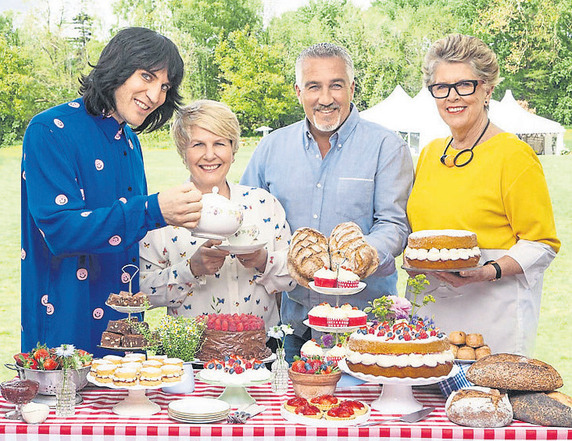Bake Off bun fight
A new era has dawned for that most British of institutions, The Great British Bake Off.

When it was announced in early 2017 that Channel 4 had bought the rights to a show which had almost become synonymous with the BBC, its host channel for seven series, nothing short of uproar poured out from its loyal and protective audience. Then came the news that the endearing and impeccably dressed baking royalty Mary Berry, along with long-time presenters Mel and Sue, would not be joining judge Paul Hollywood in the channel move, which is just about the equivalent to using sultanas instead of chocolate chips in any baked goods (no one is happy about that kind of surprise).
Having only watched one series of the show at that stage, and even then under duress, I rolled my eyes for the entire week during which this bun fight took place all over social media and the UK-wide-web. (Sorry, sorry, enough of the half-baked puns – I’ll draw a line there).
Pleasant surprise
With my four housemates intending to watch the new incarnation of the series together, and not wanting to be left out, I find myself watching my second series of The Great British Bake Off (which it still very much remains, despite the advert breaks). Now that I’ve stopped rolling my eyes and judgmentally writing it off as another waste-of-space talent show, I can actually stop to appreciate it where my cynicism prevented me from doing so before. Lesson number one in a series of lessons I didn’t expect to be taught by a televised baking competition was that, when you give something a chance, it might pleasantly surprise you.
The Great British Bake Off isn’t just a melodramatic commercialisation of a domestic activity (though it may, on occasion, be that), it’s a show whose seams burst with creativity, variety, commitment and beauty. Week after week its contestants steward the ingredients and time given to them to the best of their ability, under the immense pressure of the camera zoom. Paying the closest attention to the things in front of them, they make the most of every moment, mixing ingredients with the hopeful expectation that it’ll come together well at the end of all their effort. And, with 12 or so contestants, the things produced are vastly varied. Just the first episode of this new series saw cakes baked in the form of a terrarium, a clutch bag, a watermelon and a pork pie.
Counter-cultural passion
The bakes say something about their baker, and each has a story behind it. As the contestants explain the reasons why they’ve chosen to bake the things they do they, time and time again, admit that they’re not individuals in a vacuum, but products of their communities, their homes, their stories. They are baking out of all of this background. And they’re not embarrassed about it, despite our culture saying that we should decide for ourselves who we are, and not be formed by where we’ve come from.
Nor are they embarrassed about their love of baking, which is plain to see. This passion drives them to the point of tears when things go badly, as well as when things go well. This is refreshing to our cynicism-sore society. As an audience we watch the contestants week after week pour their heart and soul into what they’re baking, watch them talk about how their love of baking was brought about by a beloved grandmother, or how baking for their children or friends makes them feel glad to be alive. We live in a culture prone to embarrassment and self-obsession, where we don’t own up to loving things half as much as we really do, because we want to avoid the vulnerability of owning up to our passions. This permeates Christian culture by having us dull down our God-given passions because we think we ought to reserve speaking passionately for the times when Jesus is the subject, as if our love for him is separate from the things he’s made us to love, all of which will one day be reconciled to him.
Celebrating God’s creation
I more than once rolled my eyes at people on TV crying about cakes they’ve baked (or failed to bake), but it’s undeniable that this is a show which has wended its way into the bloodstream of television programming, as well as the nation’s hearts. But now I’m glad to partake in this tradition – because that’s surely what it’s become – which celebrates passionate creativity, careful attention to detail, and abundant variety, and in doing so shows off so much of the goodness of God’s creation.
Angeline Liles works in Cambridge and tweets @brighterbeat.


